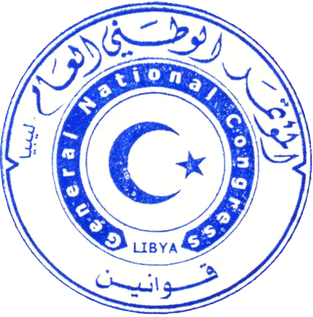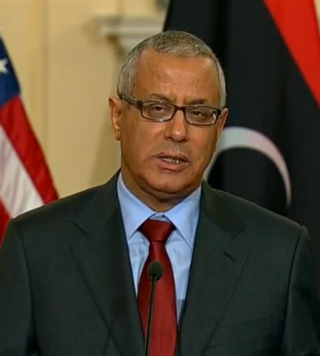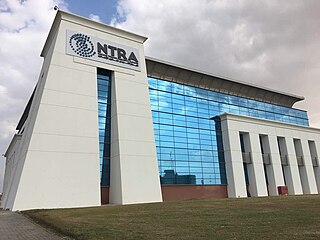Related Research Articles

The International Telecommunication Union (ITU) is a specialized agency of the United Nations responsible for many matters related to information and communication technologies. It was established on 17 May 1865 as the International Telegraph Union, significantly predating the UN and making it the oldest UN agency. Doreen Bogdan-Martin is the Secretary-General of ITU, the first woman to serve as its head.
Nepal's telecommunication network has increased over the years significantly, with the number of telephone users reaching 40,789,198 as of 14 May 2019.
Telecommunications in Pakistan describes the overall environment for the mobile telecommunications, telephone, and Internet markets in Pakistan.

Communications in Somalia encompasses the communications services and capacity of Somalia. Telecommunications, internet, radio, print, television and postal services in the nation are largely concentrated in the private sector. Several of the telecom firms have begun expanding their activities abroad. The federal government operates two official radio and television networks, which exist alongside a number of private and foreign stations. Print media in the country is also progressively giving way to news radio stations and online portals, as internet connectivity and access increases. In 2012, a National Communications Act was also approved by Cabinet members, and 2 October 2017, the president of Somalia Finally signed the National Communications Law, and became the official Law that regulated the ICT industry. Under that Law, National Communications Authority (NCA) of the federal Republic of Somalia has been established, with board of directors and a general manager. Somalia currently is ranked first in Africa for most affordable mobile data per gigabyte and 7th in the world.
Modern telecommunications in Thailand began in 1875 with the deployment of the first telegraph service. Historically, the development of telecommunication networks in Thailand were in the hands of the public sector. Government organisations were established to provide telegraph, telephone, radio, and television services, and other government agencies, especially the military, still control a large estate of radio and television spectra. Private telecommunication operators initially acquired concession agreements with state enterprises. For mobile phone services, all the concessions have been amended by successive government to last 25 years have gradually ended in 2015. For other services, the concession terms and conditions vary, ranging from one to fifteen years. Nearly all of the concessions are build-operate-transfer (BTO) contracts. The private investor has to build all the required facilities and transfer them to the state before they can operate or offer services to public.

Tarek Kamel was an Egyptian politician and computer engineer expert in global Internet governance issues.

The Australian Minister for Communications has the overall responsibility for broadcasting, the information and communications technology industry, the information economy, and telecommunications within Australia. The portfolio is currently held by Michelle Rowland in the Albanese ministry since 1 June 2022, following the Australian federal election in 2022.
The Communications Authority of Kenya (CA) is the independent regulatory agency for the ICT industry in Kenya with responsibilities in telecommunications, e-commerce, broadcasting,cyber security, and postal/courier services. The CA is also responsible for managing the country's numbering and frequency spectrum resources, administering the Universal Service Fund (USF) as well as safeguarding the interests of users of ICT services.
The Ministry of Information Technology and Telecommunication, abbreviated as MoITT) is a Cabinet-level ministry of the Government of Pakistan concerned with Information Technology and Telecommunications.
Botswana Telecommunications Authority (BTA) is a dissolved independent commission that was responsible for regulating all matters related to telecommunications, postal services of Botswana and has been succeeded by Botswana Communications Regulatory Authority. The Minister appoints all five board members, who serve on a part-time basis. The BTA is mandated to promote the development and provision of efficient telecommunications and broadcasting services in Botswana, under the terms of the Telecommunications Act 15 of 1996. There have been legal disputes between the BTA and licensed operators, springing from issues related to interconnection and pricing.

The Egyptian Ministry of Communications and Information Technology (MCIT) is a government body headquartered in Smart Village Egypt. Established in 1999, the Ministry is responsible for information and communications technology (ICT) issues in the Arab Republic of Egypt, including the planning, implementation, and operation of government ICT plans and strategies. It is led by the Minister of Communications and Information Technology, who is nominated by the Prime Minister and is a member of the Cabinet. The current ICT Minister is Amr Talaat, who assumed office on June 14, 2018.
Information technology in Pakistan is a growing industry that has the potential to expand more in the future. Matters relating to the IT industry are overseen by the Ministry of Information Technology of the Government of Pakistan. The IT industry is regarded as a successful sector of Pakistan economically, even during financial crisis. The first IT policy and implementation strategy was approved under the leadership of Atta-ur-Rahman, the Federal Minister of Science and Technology in August 2000 which laid the foundations of the development of this sector. The emphasis was placed on quality IT education in universities rather than numbers during this period. The quality measures introduced by Atta-ur-Rahman as Chairman of Higher Education Commission during 2002-2008 included:1) All PhD thesis were evaluated by eminent foreign scientists,2) All PhD thesis and research papers were checked for plagiarism 3) Some 11,000 students were sent abroad to leading universities for PhD level training and absorbed on their return, 4) Appointments at faculty positions were linked to international stature of the applicants as judged from their international publications, patents and citations, and (5) Quality Enhancement Cells were established in all universities for the first time in the history of the country. Thereafter two policies were launched by the Ministry of IT under the leadership of Anusha Rahman Khan, Federal Minister for IT and Telecom (2013-2018). The Telecom Policy was announced in December 2015, and later National Digital Pakistan Policy that was approved by the cabinet in May 2018. In 2001, a 15 year tax holiday was approved to promote the IT industry which has the grown from $30 million to over $3 billion during the last 16 years. A nationwide programme to train teachers was initiated by Intel in March 2002 in Pakistan on the request of Atta-ur-Rahman which has resulted in the training of 220,000 teachers across 70 districts at no cost to the government. The government of Pakistan has given incentives to IT investors in the country during the last decade, this resulted in the development of the IT sector. From 2003 to 2005, the country's IT exports saw a rise of about fifty percent and amounted a total of about 48.5 million USD. The World Economic Forum, assessing the development of Information and Communication Technology in the country ranked Pakistan 111th among 144 countries in the Global Information Technology report of 2014. In an analysis of scientific research productivity of Pakistan, in comparison to Brazil, Russia, India and China, Thomson Reuters has applauded the developments that have taken place as a result of the reforms introduced by Atta-ur-Rahman, since Pakistan has emerged as the country with the highest increase in the percentage of highly cited papers in comparison to the "BRIC" countries. Atta-ur-Rahman is Co-Chairman of the Prime Ministers Task Force on Information Technology and Telecommunications. As a result of the measures introduced on the recommendation of the Task Force, there has been a sharp increase in software exports of Pakistan.

The General National Congress or General National Council was the legislative authority of Libya for two years following the end of the First Libyan Civil War. It was elected by popular vote on 7 July 2012, and took power from the National Transitional Council on 8 August.

Ali Zeidan is a former Prime Minister of Libya. He was appointed by the General National Congress on 14 October 2012, and took office on 14 November after Congress approved his cabinet nominees. Prior to the Libyan Civil War, Zeidan was a Geneva-based human rights lawyer. According to the BBC, he is considered by some local observers as a strong-minded liberal. He was ousted by the parliament committee and fled from Libya on 14 March 2014. However, he told a press conference in Rabat, Morocco, that the ousting was invalid.

The cabinet was selected by Prime Minister Ali Zeidan on 30 October 2012 and was approved by the General National Congress on 31 October 2012 together with approving Zidan as Libya's first post-war Prime Minister. The cabinet is composed of the following ministers: Two women were selected to cabinet, and select ministries went to political independents who were not associated with any party.

Atef Helmy Nagib is an Egyptian communication and technology expert and the former minister of communications and information technology.
Abdussalam Al Qadi is a Libyan politician who served as the third deputy prime minister between November 2012 and 29 August 2014.

Telecommunications Consultants India Limited (TCIL) is a central public sector undertaking. It is under the ownership of the Department of Telecommunications, Ministry of Communications, Government of India. It was set up in 1978 to give consultations in fields of Telecommunications to developing countries around the world. Started with an initial investment of 10lakh. TCIL is present in almost 80 countries, mainly in the Middle East, Africa and Europe.

Ministry of Communications is a Central ministry under the Government of India responsible for telecommunications and postal service. It was carved out of Ministry of Communications and Information Technology on 19 July 2016.

The National Telecommunications Regulatory Authority, commonly known as NTRA, is the Egypt government-approved regulatory and competition authority that was established in accordance of the Egyptian telecommunication regulation law No. 10/ 2003 as the national Authority equipped to regulate and administer the telecommunications region. Regulating the competition environment between the operators inside the industry according to the Egyptian constitution was a huge mandatory case after the huge rate of telecommunication technology growth, as well as ensuring the availability of qualitative and green telecommunications services.
References
- ↑ Congress votes to approve Zeidan Government; six members referred to Integrity Commission
- ↑ Asmaa Elourfi (31 October 2012). "Libya government formation sparks protest". Magharebia.
- ↑ "Full Listing of Proposed New Libyan Cabinet". Libya Business News. 31 October 2012.
- ↑ "Libya's interim government resigns under pressure". Deccan Chronicle. AFP. 29 August 2014. Retrieved 30 August 2014.
- ↑ "Libya government resigns to allow new cabinet". Al Jazeera English. 29 August 2014. Retrieved 28 August 2014.
- ↑ Libya's parliament approves new government Reuters. Retrieved 28 September 2014.
- ↑ "Libya to Offer Third GSM License in Three to Six Months". Bloomberg.com. 9 September 2013.